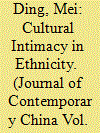| Srl | Item |
| 1 |
ID:
173932


|
|
|
|
|
| Summary/Abstract |
Qingzhen in Mandarin and musulmanche in Uyghur are two local expressions of halal in China. This article investigates the local meanings of halal from the perspectives of Uyghurs and Hui, who are the major Muslim ethnic minorities in China. It argues that the expressions of qingzhen and musulmanche demonstrate social concerns, anxiety of ethnic identity and ongoing intra-group competitions, which are not exclusively related to religion. The secularisation process since the qingzhen food debate has created tensions between the state and individuals of Uyghur and Hui and has embarrassed people within the same group. This tension between ethnicity and religion is largely the result of clarifying the ambiguity that bears in cultural intimacy, which originally keeps a balance between the state and its ethnic minorities.
|
|
|
|
|
|
|
|
|
|
|
|
|
|
|
|
| 2 |
ID:
159218


|
|
|
|
|
| Summary/Abstract |
Based on anthropological fieldwork conducted in the Xinjiang Uyghur Autonomous Region in China in 2016 and 2017, this article addresses the meanings of security from subjective perspectives by investigating Uyghur perceptions of marriage, which offer crucial insight into the meanings of security. The Uyghurs, as the major indigenous population in Xinjiang, have encountered securitization, particularly since the 2009 Ürümchi riots, deemed the worst ethnic conflict in the region since 1949. While official security practices based on stability have won the support of most Han Chinese citizens in and outside Xinjiang, these same security practices have penetrated to and influenced intimate Uyghur life, such as marriage. Uyghur participants in this research indicate that marriage is a social field in which the official counter-extremism campaign, individuals’ happiness (bext), and the security (bixeterlik) of the Uyghur collective identity encounter and negotiate with each other.
|
|
|
|
|
|
|
|
|
|
|
|
|
|
|
|